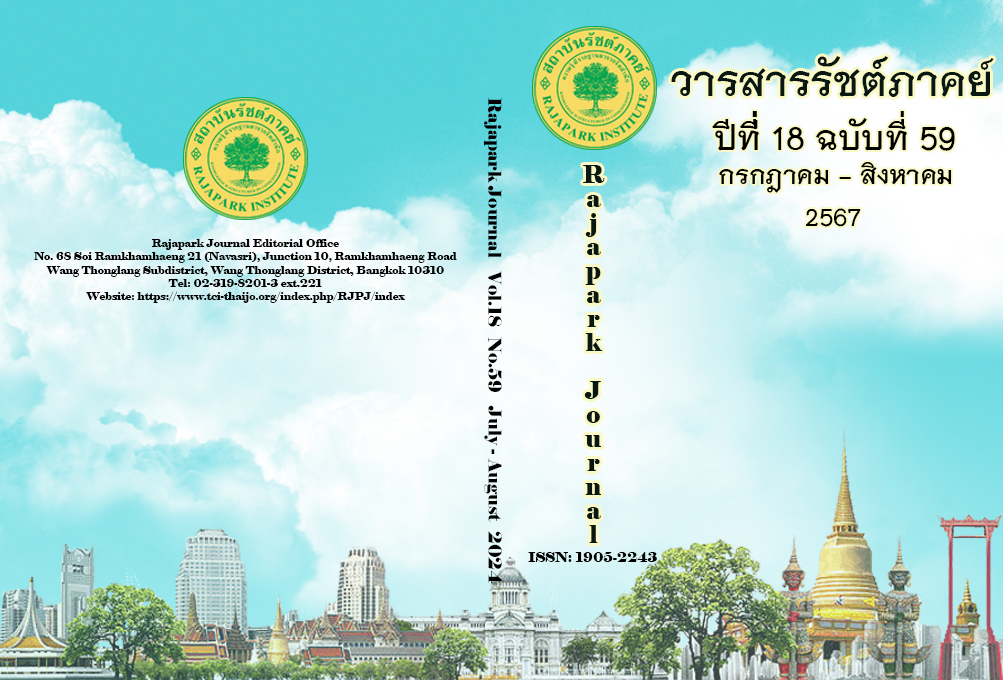A Development of Competency-Based Curriculum for Vocational Skills by using the Professional Learning Community
Main Article Content
Abstract
This qualitative research aimed to: 1) study fundamental data to develop a competency-based curriculum for vocational skills 2) develop a competency-based curriculum for vocational skills, and 3) study the results of using a competency-based curriculum for vocational skills learning in the professional learning community. The target group is from twenty schools and five people per school, so there were one hundred people in total, which comprise 20 administrators and 80 teachers in Mueang District and Pak Phayun District, Phatthalung Province. There were 2,152 students in the experimental group for the academic year 2023. The research is a mixed method, and the research instruments are structured interviews, a focus group discussion form, an appropriate curriculum evaluation form by specialists, and an evaluation form for using the curriculum by students. The statistics used to analyze information are mean, standard deviation, and descriptive analytics.
The research findings revealed 1) that data analysis on low-income households and community context data of students in both Mueang District and Pak Phayun District, Phatthalung Province, overall indicated potential livelihood capabilities across five aspects of a challenging situation, with livelihood capabilities considered sufficient. 2) That is, households have enough income to support them but may have some debt. Most families are engaged in agricultural activities, labor work, and traditional fishing, which serve as the primary livelihood base. These fundamental livelihoods were a framework for developing competency-based curricula for vocational skills in schools to align with the local way of life. According to competency-based curriculum development for vocational skills using community-based learning, twenty curricula have been developed. The competency-based curriculum development for vocational skills learning for twenty curriculums and appropriate curriculum evaluation results were at a high level, and 3) after using the competency-based curriculum for learning vocational skills Students have a high level of vocational skills.
Article Details

This work is licensed under a Creative Commons Attribution-NonCommercial-NoDerivatives 4.0 International License.
Views and opinions appearing in the Journal it is the responsibility of the author of the article, and does not constitute the view and responsibility of the editorial team.
References
Chaichawarat, R. (2015). Propulsion the PLC process. Office of Teacher Development and Basic Education Personnel, Office of the Basic Education Commission.
Chookamnerd, W., Sungtong, E., & Kerdtip, C. (2014). A model of a professional learning community of teachers towards 21st century learning of schools in Thailand. Hat Yai Academic Journal, 12(2), 123-134. https://so01.tci-thaijo.org/index.php/HatyaiAcademicJournal/article/view/82548
Kaewsuksaeng, S. et al. (2022). Research and innovation to solve extreme poverty problems completed and in depth in Phatthalung. Thaksin University. https://pmua.or.th/3840/
Ministry of Education. (2008). Basic education core curriculum (revised edition 2017). Agricultural Cooperatives Association of Thailand Printing Press.
Office of the Education Council, Ministry of Education. (2017). The research and development curriculum development and organizing competency-based teaching and learning according to the national qualifications framework. Office of the Basic Education Commission.
Office of the Education Council. (2021). The development guidelines for the core competencies of students at the basic education during the transition to competency-based curriculum. Office of the Basic Education Commission.
Office of the Phatthalung Province. (2021). Strategic plan of Phatthalung Province, 5 years 2023-2027. Strategy and Information for Provincial Development Working Group.
Office of the National Economic and Social Development Council. The Prime Minister's Office. (2022). National Economic and Social Development Plan No. 13 (2023-2027). Royal Gazette. http://www.ratchakitcha.soc.go.th/DATA/PDF/2565/E/258/T_0001.PDF
Phatphon, M. (2024). Contemporary curriculum development model (2nd ed.). Leadership Center. Curriculum and learning innovation.
Sanchez, A. V., & Ruiz, M. P., (2008). Competence-based learning: A proposal for the assessment of generic competence. University of Deusto. Bilbao. Span.
Taba, H. (1962). Curriculum development: Theory and practice. Harcourt, Brace & world.
The Office of Her Royal Highness Princess Maha Chakri Sirindhorn’s Projects. (2017). Development plan children and youth in remote areas according to the royal initiative of Her Royal Highness Princess Maha Chakri Sirindhorn, Issue 5, 2017-2026. Active Print.
The World Bank. (2022). Learning losses. https://thedocs.worldbank.org/en/doc/e52f55322528903b27f1b7e61238e416-0200022022/related/WBG-LearningLosses-flier-10-09-22-e-version.pdf
United Nations, Thailand. (2020, July 1). Social impact assessment of COVID-19 in Thailand. https://thailand.un.org/en/91973-social-impact-assessment-covid-19-Thailand
Wiwathamongkol, K. (2021). Professional learning community: Concepts, processes, techniques. Faculty of Education, Kanchanaburi Rajabhat University.


